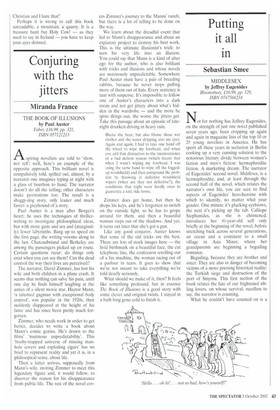Conjuring with the jitters
Miranda France
THE BOOK OF ILLUSIONS by Paul Auster Faber, £16.99, pp. 321, ISBN 057121213 Aspiring novelists are told to 'show, not tell': well, here's an example of the opposite approach. This brilliant novel is compulsively told, spilled out, almost, by a narrator one imagines typing at night with a glass of bourbon to hand. The narrator doesn't do all the telling; other characters make perorations too, The result is a shaggy-dog story, only leaner and much faster: a greyhound of a story.
Paul Auster is a man after Borges's heart; he uses the techniques of thrillerwriting to investigate philosophical ideas, but with more guns and sex and (marginally) fewer labyrinths. Bang up to speed on the first page, the writing vrooms along to the last. Chateaubriand and Berkeley are among the passengers picked up en route. Certain questions recur: do things only exist when you can see them? Can the dead control the way their lives are perceived?
The narrator, David Zimmer, has lost his wife and both children in a plane crash. It seems that nothing can salve his pain, until one day he finds himself laughing at the antics of a silent movie star. Hector Mann, 'a talented gagman with exceptional body control', was popular in the 1920s, then suddenly disppeared at the height of his fame and has since been pretty much forgotten.
Zimmer, who needs work in order to get better, decides to write a book about Mann's comic genius. He's drawn to the films' mutinous unpredictability'. This 'booby-trapped universe of missing manhole covers and exploding cigars' has no brief to represent reality and yet it is, in a philosopical sense, about life.
Then a letter arrives, supposedly from Mann's wife, inviting Zimmer to meet this legendary figure and, it would follow, to discover the reason for his disappearance from public life. The rest of the novel cov
ers Zimrner's journey to the Manns' ranch, but there is a lot of telling to be done on the way.
We learn about the dreadful event that led to Mann's disappearance and about an expiatory project to destroy his best work. This is the ultimate illusionist's trick: to turn his very life into an illusion. You could say that Mann is a kind of alter ego for the author, who is also brilliant with tricks and illusions and whose novels are mutinously unpredictable, Somewhere Paul Auster must have a pair of breeding rabbits, because he never stops pulling more of them out of hats. Every sentence is taut with suspense. It's impossible to follow one of Auster's characters into a dark room and not get jittery about what's hidden in the wardrobe — and the more he spins things out, the worse the jitters get. Take this passage about an episode of latenight drunken driving in heavy rain.
Blame the beer, but also blame those wet clothes and the water dripping into my eyes. Again and again: I had to take one hand off the wheel to wipe my forehead, and when you add that distraction to the inconvenience of a had defrost system (which meant that when I wasn't wiping my forehead, I was using the same hand to wipe off the foggedup windshield) and then compound the problem by throwing in defective windshield wipers (when are they not defective?), the conditions that night were hardly ones to guarantee a safe ride home.
Zimmer does get home, but then he drops his keys, and he's forgotten to switch on the outside light, so he has to grope around for them, and then a beautiful woman steps out of the shadows. And yes, it turns out later that she's got a gun.
Like any good conjuror, Auster knows that some of the old tricks are the best. There are lots of stock images here — the livid birthmark on a beautiful face, the cut telephone line, the confession scrolling out of a fax machine, the woman racing out of a parlour in tears. It goes to show that we're not meant to take everything we're told deadly seriously.
What should we make of it, then? It feels like something profound, but in essence The Book of Illusions is a good story with some clever and original twists. I stayed in a bath long gone cold to finish it.




































































 Previous page
Previous page